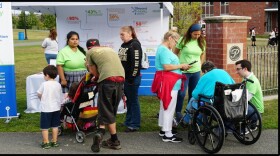As the number of COVID-19 cases rises in the United States amid a global outbreak of a novel coronavirus, both federal and state health officials urge communities to prepare for the spread of disease.
U.S. Surgeon General Vice Adm. Jerome M. Adams met with state leaders and health officials Monday at the Connecticut Department of Public Health Laboratory in Rocky Hill.
“We’re going to give them the information on what we know and on what we don’t know, and then we’re going to trust Americans to make the appropriate decisions to protect their health,” Adams said. “And the most appropriate thing to do is to prepare, but not panic.”
The U.S. Centers for Disease Control and Prevention Friday approved the state’s health lab to test for COVID-19, a move that Gov. Ned Lamont said will strengthen public health response to any local outbreaks.
The lab tested samples over the weekend from two patients with suspected COVID-19. DPH officials confirmed that both tests came back negative.
“We can get a test done in three, four, five hours, give people confidence that they don’t have this virus, and we can prepare that even more,” Lamont said. “If we need to, we’ll be able to do the testing at the local hospital level as well.”
Other New England states like Rhode Island and New Hampshire have reported new cases of COVID-19. At this time, Connecticut does not have a positive case, but DPH Commissioner Renée Coleman-Mitchell said the situation is “extremely fluid and dynamic” and that “it can change at any moment.”
Coleman-Mitchell met with state legislators and other public health officials in Washington, D.C., last week to coordinate national and regional response to the health threat as well as a need for more support.
“We need to stay ahead of this as much as we can. We need to stay prepared,” she said. “But in order to do that, we need resources -- specifically funding.”
Some lawmakers like U.S. Sen. Richard Blumenthal have blamed partisanship in Congress for getting in the way of appropriating the amount of money that he says is needed to address the public health threat.
Blumenthal called for funding beyond the $2.5 billion that the Trump administration has proposed -- he said $8.5 billion is needed for an effective response.
“And at least $2 billion of that money will go to reimburse local and state governments exactly like Connecticut that are proactive to help stop this virus from spreading,” he said.
He proposed putting at least $3 billion into the federal Public Health Emergency Fund, $1 billion toward vaccine development, and other money for global health efforts.
It is unclear how much money Connecticut would get from any federal funds that are carved out for response to COVID-19.
Lamont was scheduled to get on a call Monday with Vice President Mike Pence, who was appointed by President Donald Trump to oversee the federal response. The Connecticut governor said he planned to talk to Pence about developing a unified message on the disease outbreak among all levels of government.

What Residents Can Do To Protect Themselves
Adams said individual risk of becoming ill with COVID-19 remains low for many in Connecticut. If a local outbreak were to occur, he said most people would likely have mild cases with symptoms similar to a cold or the flu.
“But just as with the flu, if you are someone who is unhealthy, who has cardiovascular disease or lung disease or other comorbidities, you will be at higher risk [of serious illness] if you get the coronavirus,” Adams said.
He recommended that those people should rethink traveling at this time and take extra precautions.
Coleman-Mitchell said everyone can take basic precautions to limit the chances of getting COVID-19 and spreading disease. They include frequent handwashing, covering coughs and sneezes and refraining from handshakes.
“We also ask that you stop, if you can, stop touching your eyes, your nose and your mouth,” she said, “and we ask that there be some social distancing when you have experiences with individuals with symptoms.”
Adams also recommended that people get a flu shot if they haven’t already done so. The influenza vaccine does not protect against the new strain of coronavirus, but Adams said it significantly decreases a person’s chance of being hospitalized for the flu.
“We know that hospitals are overflowing with flu patients,” he said. “Every flu patient who takes up a bed in a hospital is a bed that’s not available for a potential coronavirus case.”
Adams said being prepared is important, but there are things residents should not do.
"There are things that can actually harm you and your community, and going out and hoarding [face] masks is one of those things,” he said.
Adams added that people who are not health care workers and who have not been advised to wear a face mask by a health professional “often wear them improperly,” limiting their effectiveness against respiratory disease.
“Folks who aren’t comfortable wearing a mask will often touch their face more frequently and adjust the mask, and can actually increase their risk of exposure to flu or coronavirus,” he said. “If we actually utilize masks inappropriately in the community and in the general public, they won’t be available for health care workers who actually need them to respond.”
The state government will continue to monitor and track suspected cases. Information on response efforts and resources in Connecticut are at ct.gov/coronavirus.





